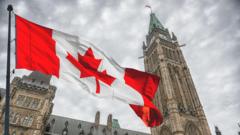A coalition of prominent Canadian news organizations is suing OpenAI, alleging copyright infringement related to the use of their articles in ChatGPT's training data. The lawsuit could have significant implications for the AI industry and media rights.
Canadian News Organizations Unite to Sue OpenAI Over Copyright Allegations

Canadian News Organizations Unite to Sue OpenAI Over Copyright Allegations
Major Canadian media companies file a landmark lawsuit against OpenAI, claiming illegal use of their content for AI training.
A coalition of some of Canada’s largest media companies has initiated legal proceedings against OpenAI, the firm behind the artificial intelligence language model ChatGPT. This lawsuit marks a significant development in the ongoing debate over intellectual property rights in the age of AI.
On Friday, five leading Canadian news entities, including the Globe and Mail, the Toronto Star, and the Canadian Broadcasting Corporation (CBC), filed their joint lawsuit in Ontario's Superior Court of Justice. They argue that OpenAI has unlawfully utilized their original content to train its AI systems and are seeking billions in damages—an unprecedented figure for such a case in Canada.
The accusations echo a similar lawsuit that arose in the United States in 2023, where The New York Times claimed copyright infringements against OpenAI and Microsoft. While those parties have denied the allegations, the Canadian lawsuit is the first of its kind within the country's legal framework.
As part of their claims, the Canadian outlets assert they are owed 20,000 Canadian dollars (approximately $14,700) for every article they believe was unjustly scraped and incorporated into OpenAI’s models. Additionally, they seek a portion of the profits that OpenAI has allegedly derived from their content, along with measures to prevent future misuse of their work.
Responding to the lawsuit, a spokesperson from OpenAI stated that the company had not yet had the chance to thoroughly review the legal allegations. He emphasized that OpenAI’s training methods are based on publicly available data and are aligned with fair use principles and international copyright laws that protect creators while fostering innovation.
This landmark case emphasizes the urgent need to clarify legal standards concerning data use in AI, with wide-ranging implications for the media and technology sectors alike. As artificial intelligence increasingly intersects with copyright law, the outcomes of such lawsuits will likely shape the future landscape of content creation and consumption.



















